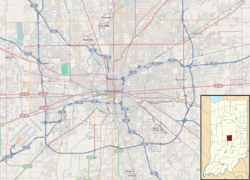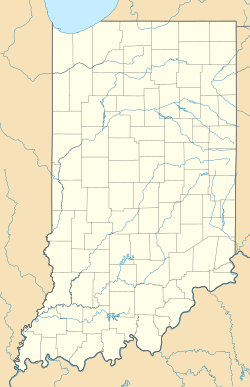Indiana Avenue facts for kids
Quick facts for kids |
|
|
Indiana Avenue Historic District
|
|
|
Clockwise from top left: Madam Walker Legacy Center, Crispus Attucks High School, Bethel A.M.E. Church, and Lockefield Gardens
|
|
| Location | 500 block of Indiana Ave. between North St., Central Canal, Michigan, and West Sts., Indianapolis, Indiana |
|---|---|
| Area | 3 acres (1.2 ha) |
| Built | 1869-1935 |
| Architectural style | Italianate |
| NRHP reference No. | 87000912 |
| Added to NRHP | June 12, 1987 |
Indiana Avenue is a special historic area in downtown Indianapolis, Indiana. It is one of seven special cultural districts in the city. In its best days, Indiana Avenue was a very important center for African American culture. The Indiana Avenue Historic District, which is part of this area, was named a national historic place in 1987.
Contents
A Look Back at Indiana Avenue
In 1870, nearly 1,000 African Americans lived on Indiana Avenue. This was about one-third of all African Americans in Indianapolis at the time. As more African American families moved to the area, many Black business owners opened shops. You could find businesses on almost every street corner.
Early Businesses and Community
Bethel A.M.E. Church is the oldest African American church in Indianapolis. It started in 1836. By 1865, African American-owned businesses were already open on the Avenue. These included a grocery store and a "peddler shop." The Indianapolis Leader newspaper also started publishing in the 1870s. It was the first Black-owned newspaper in Indianapolis. It shared news important to the growing African American community.
A Hub for Black Culture
Indiana Avenue grew into a vibrant cultural center. It was similar to the Harlem Renaissance in New York City. Because of laws that kept Black and white people apart, many streets like Indiana Avenue became important. Other examples include Beale Street in Memphis. These places were sometimes called "Black Entertainment Boulevards." They were also stops on the "Chitlin' Circuit." This was a network of places where Black performers could entertain during a time when many venues were segregated.
Famous People from the Avenue
Many important historical figures have ties to Indiana Avenue. These include Madam C.J. Walker, who was a successful businesswoman. Famous jazz musicians like Freddie Hubbard and Wes Montgomery also came from here. Mary Ellen Cable was a key African American educator in Indianapolis. She also helped start and lead Indiana's NAACP chapter.
The Famous Madam Walker Theatre
Madam C.J. Walker's daughter helped build the Madam Walker Theatre. It opened on Indiana Avenue in 1927. People quickly called it the "Crown Jewel of the Avenue." It became a very popular place for entertainment and community events.
Changes and Comebacks
In the late 1950s, laws that kept people apart began to change. Many African American families started moving to other parts of Indianapolis. This meant that Indiana Avenue became less busy. By 1965, the Madam Walker Building was almost empty. The area started to look run down by the early 1970s.
A New Beginning
By the 1980s, parts of the area were torn down. New office buildings and homes were built. In 1987, eleven historic buildings in the area were recognized as a national historic district. These buildings were built between 1869 and 1935. They show a style of building called Italianate.
The Madam Walker Building was one of these historic places. It was fixed up and reopened in 1988. Today, it focuses on performing arts. In 2007, the name of Indiana Avenue was brought back for some parts of the street. This showed new efforts to bring life back to the area.
 | Isaac Myers |
 | D. Hamilton Jackson |
 | A. Philip Randolph |









